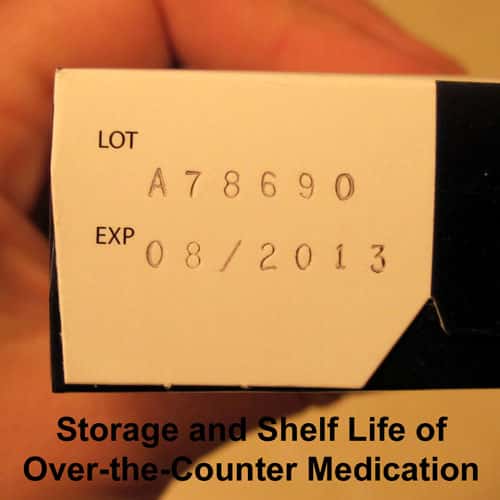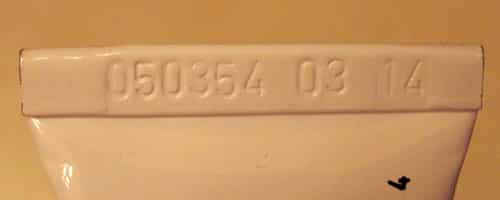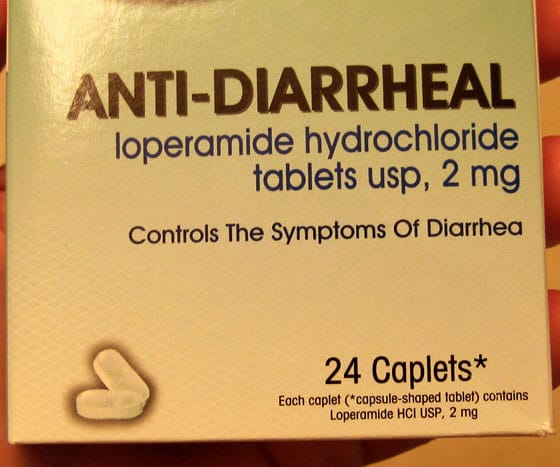

| Visitors Now: | |
| Total Visits: | |
| Total Stories: |

| Story Views | |
| Now: | |
| Last Hour: | |
| Last 24 Hours: | |
| Total: | |
Preparedness – Storage and Shelf Life of Over-the-Counter Medication
This is a guest post by Lily Pearce.
Most households have supplies of certain non-prescription medications, such as painkillers, anti-diarrhea tablets, laxatives and antacids. However, most people give very little thought to the storage and shelf-life of over the counter medication, beyond keeping things out of the reach of children. If you have an emergency medical kit, you may stock up and end up storing items for longer periods of time. How long is too long to store over the counter medication, and what’s the best way to store it?
Storage and Shelf Life of Over-the-Counter Medication – How Long is Too Long?
Medicines, like food products, have an expiration date on their packaging. The expiration date on medication is the date beyond which the manufacturers can no longer guarantee full effectiveness or safe usage.
Generally, over-the-counter medicines should have a shelf life of around four or five years, meaning they should last around that long after the date they are purchased.
How to Correctly Store Medication
Most people will throw food out once it passes its ‘use by’ or ‘best before’ date, as it is no longer guaranteed to be safe to consume. The same thing ultimately applies to medicine. Once beyond the expiration date, manufacturers cannot be held legally responsible for any damage the medicine does to you and can no longer guarantee the medicine will actually do what it is supposed to do.
So should you throw medicine out as soon as it reaches its expiration date?
The answer is somewhat complicated but – not necessarily.
Research carried out by the U.S. Army Medical Materiel Agency has suggested that most over-the-counter medication, including medicine bought from an online pharmacy, actually remains stable for several years after reaching its expiration date, assuming correct storage procedures have been followed.
Correct storage typically requires the medicine to be kept somewhere dry, away from extreme temperatures and below 25 degrees Celsius (-13 Fahrenheit). A cabinet, cupboard or medicine box is ideal for this purpose.
Medicine should also be stored in its original packaging and should remain sealed prior to use. Tablets that are packaged in blister packs are still classified as sealed even if the outer packaging has been opened. However, medicine that is packaged in a bottle, which has been opened, should be used before reaching the expiration date, as the medicine will have been exposed to oxygen within the air, leaving it prone to microbial contamination.
Generally, even years after the expiration date, most medicines will be safe to consume. Their effectiveness, on the other hand, cannot be so easily guaranteed. So, for instance, if you have a headache and you find acetaminophen tablets that are a year past their expiration date, it is safe to take them and they will most likely help, however, they may be less effective than acetaminophen would usually be in this situation.
Which Medications Should NOT be Taken Past Their Expiration Date
For the most part, medicine will remain safe to consume past its expiration date, however, there are some exceptions.
Insulin, eye drops and antibiotics should never be used beyond their expiration date. In actual fact, in most instances, these medications will have a discard date which kicks in once they are opened. Any medicine with a ‘discard date’ rather than an expiration date should not be used beyond this date, under any circumstances.
Tablets and capsules have been found to be more stable than liquid medications, so it would be wise to refrain from using liquid medicines after they expire.
Additionally, medicines which have been exposed to light, heat or moisture, for any reason, should not be used beyond their use by date.
Further Safety Precautions
Although taking medicines such as acetaminophen or diarrhea capsules beyond their expiration date is acceptable as a last resort, it is still not recommended and should only be done in an emergency situation, where no other possible alternatives exist.
You should still safely dispose of the old medication (see FDA safe medicine disposal guidelines) and replace it as soon as possible, in order to guarantee you receive the maximum benefit in the future.
Furthermore, while the potency and effectiveness of the medicine may decline after it reaches its expiration date, it is still vital that you stick to the recommended dosage for any medicine. Under absolutely no circumstances should you try to compensate for this loss of effectiveness by exceeding the recommended dosage.
If you remain in any doubt as to whether your medicine is safe to consume, avoid doing so and check with a pharmacist.
Lily Pearce is a health writer for one of only two fully licensed online prescribing pharmacies in the US. She grew up in Phoenix but is currently visiting family in Italy and completing her work with a view of the Mediterranean.
BR>
Common Sense Homesteading
about using common sense to be more self-reliant, with an emphasis on home
food production.
2012-11-11 20:02:50
Source: http://www.commonsensehome.com/storage-and-shelf-life-of-over-the-counter-medication/
Source:






